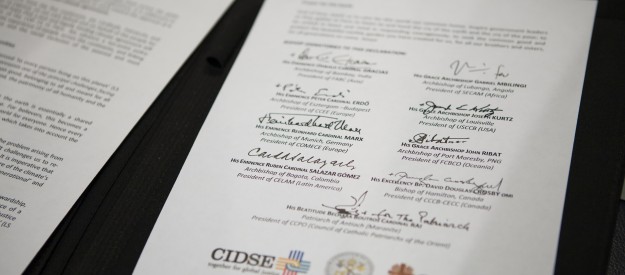"We are losing our attitude of wonder, of contemplation, of listening to creation and thus we no longer manage to interpret within it what Benedict XVI calls 'the rhythm of the love-story between God and man.'"
+ Pope Francis
Five big ways the bishops’ appeal matters

While it’s anyone’s guess what the final effect will be on international climate negotiations from yesterday’s climate appeal by the presidents of continental bishops’ conferences, there are already significant implications for how Catholics look at climate change and how we should all approach the upcoming United Nations talks in Paris.
Here are five ways the appeal matters:
1. This is not just a Pope Francis issue
“We join the Holy Father in pleading for a major break-through in Paris …”
The conversation around the Catholic engagement of climate change has of late been focused on the intervention of Pope Francis (and his predecessors), both before and with Laudato Si’.
But it's now known that these climate concerns are also those of the wider magisterium. And that means more ways for the message to flow into parish life.
2. The continents are in sync
“Representing the Catholic Church from the five continents, we Cardinals, Patriarchs and Bishops have come together to express, on our own behalf and on behalf of the people for whom we care, the widely-held hope that a just and legally binding climate agreement will emerge from the negotiations of the COP 21 in Paris.”
Unity among the Successors of the Apostles—and among the continental churches—seemed uncertain these past weeks at the Synod on the Family—even after a consensus document was approved last weekend.
But this Appeal to COP21 Negotiating Parties helped bring long-sought-after alignment between the bishops of the Global South and the Global North on an issue that often strains international relations along those divisions.
This, my friends, is big. It sets the stage for profound church-state and interfaith collaboration in the months and years to come.
3. The bishops support of decarbonization
The bishops support “an end to the fossil fuel era, phasing out fossil fuel emissions, including emissions from military, aviation and shipping, and providing affordable, reliable and safe renewable energy access for all.”
This will make for no small addition to international and intranational conversations. The goal of completely restructuring the world’s energy sources, based on moral and scientific expectations, is no small request.
Yet it is now a goal supported by bishops representing nations on all ends of the energy supply chain—and who have a range of experiences in how climatological changes affect their flock.
4. The bishops link their appeal to maximum temperature rises
“We call on COP 21 to forge an international agreement to limit a global temperature increase to within those parameters currently suggested from within the global scientific community to avoid catastrophic climatic impacts, especially on the poorest and most vulnerable communities.”
This one has people talking—and debating a little, too. While cheered by many, some in the Catholic eco-sphere wanted to see a particular temperature fixed in this language. A maximum temperature increase of no more than 1.5°C over pre-industrial levels is supported by many as a target. And it has been mentioned in earlier climate negotiation statements.
But I don’t find a lack of a particular temperature to be a problem for this sort of game-changing, high-level ecclesial document. In fact, I’m glad the bishops left it open.
As a regulator, I know it’s often best not to put numbers in regulations or laws. Because then you—and the regulated community—are bound by them when it may be in everyone's best interest if this is not the case.
What if in a year’s time or two we find that the correct target for global maximum temperature increases is not 1.5°C but 1.0°C or 0.5°C? (Or 2.5°C?) Personally, I wouldn't object to zero degrees in temperature increases due to anthropogenic causes.
While I understand the reasoning behind 1.5°C (which was laid out wonderfully at yesterday’s press event by climate scientist Jean-Pascal van Ypersele), I am not wounded because a temperature is absent from this consensus.
In fact, we should be thankful that there’s room to stick to the numbers that scientific consensus tells us.
5. The bishops end with prayer
“God of love, teach us to care for this world our common home. Inspire government leaders as they gather in Paris to listen to and heed the cry of the earth and the cry of the poor; to be united in heart and mind in responding courageously; to seek the common good and protect the beautiful earthly garden you have created for us, for all our brothers and sisters, for all generations to come. Amen.”
Here the bishops remind the world of what the Church is here to offer. They end with the source of all beginnings—the Triune God of love. This should remind us that our human efforts will come to naught—or worse—without offering them first to God. Indeed, without aligning them to His will. After all, for God, all things are possible. (Mt 19:26)
Now that is a message I wish the political community would listen to.
As a prayer to St. Jude (who we celebrate today) puts it: May I seek You Lord Jesus with a sincere heart knowing that it will profit me nothing if I gain the whole world yet lose my soul.
St. Jude, pray for us.
Photo: CIDSE


















